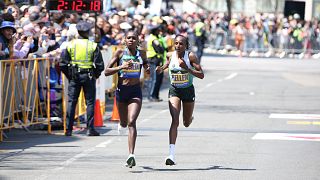USA
When Oscar-winning director Barry Jenkins was considering adapting Colson Whitehead's Pulitzer Prize-winning novel about the Underground Railroad into a limited series, he kept hearing the same thing: impossible.
It would be emotionally and mentally draining, Jenkins knew. Ultimately he worked through the doubts and the result is "The Underground Railroad."
The project is an unflinching portrayal of Cora, an enslaved woman who escapes a Georgia plantation only to be pursued by an unrelenting bounty hunter.
Along the way she must confront the anger she feels for her mother, who left her at the plantation when she was 10.
The 10-hour limited series was "the most satisfying creative experience of my life," said Jenkins, who won an Oscar in 2017 for "Moonlight" and was nominated again the next year for "If Beale Street Could Talk."
It was also the biggest challenge he's ever faced.
"The story is so, so large and wide-ranging. Before doing this, I spoke to Steven Soderbergh and Cary Fukunaga, who did 'True Detective' and 'The 'Nick,' and they both said 'It's impossible. It's going to kill you because there's no way to properly prep that many hours of any story,'" he said in a recent interview. "It was going to be a test of my skills to do that."
It was also an irresistible opportunity to, as he puts it, "re-contextualize how we view my ancestors."
To him, enslaved people showed "one of the greatest acts of collective parenting the world has ever seen."
"If everyone had taken up arms and decided they were going to rebel, everyone would have perished and there would have been all these children left behind," he said. "The choice was to protect these children out of faith that at some point this thing would end and these children would go on and carry the legacy.'"
During production, Jenkins said the most important thing to him was to protect himself, the cast and the crew from being "devoured by the barbarity."
To make sure of that, a counsellor was on set at all times. And the cast says Jenkins went to great lengths to make sure that they knew they could say when they were too close to the line or simply needed a break.
"The emotions that were brought up were all the emotions that the character dealt with, ranging from rejection, abandonment, a huge sense of loss, running from self and all of that," said Thuso Mbedu, a South African newcomer who plays Cora.
"I had to be extra aware of who I am and where I was personally at every step because those are very heavy states of being to carry and being someone who struggled with depression in 2016, I personally couldn't afford to allow myself to get into that space, especially because we're going to shoot for 10 months."
For Sheila Atim, "it did bring up a lot of anger" about "injustice and also the understanding that race-based oppression is still a thing and racism is still a thing in the world."
That's part of what drove Jenkins and the cast. They hope their work helps spark more conversations about race, inequality and injustice.
"The Underground Railroad" starts streaming on Amazon Prime on 14 May.











Go to video
The second edition of Abidjan Art Week comes to a close
Go to video
Maasai youths embrace tradition and leadership at rare warrior training camp
Go to video
30th Rabat book fair celebrates global literature, innovation, and cultural exchange
Go to video
Grand funerals of the Bôbô: Honoring the dead and celebrating unity
Go to video
Tasha Smith talks 'Desire: A Temptations Story,' working with Michelle Buteau
Go to video
Exhibition in Morocco explores a world of color